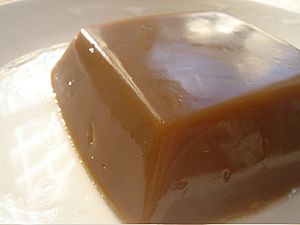Dotori-muk facts for kids
 |
|
| Alternative names | Acorn jelly |
|---|---|
| Type | Muk |
| Place of origin | Korea |
| Main ingredients | Acorn |
| Korean name | |
| Hangul |
도토리묵
|
|---|---|
| Revised Romanization | dotori-muk |
| McCune–Reischauer | tot'orimuk |
| IPA | [to.tʰo.ɾi.muk̚] |
Dotori-muk (도토리묵) is a special Korean food. It is also known as acorn jelly. This jelly is made from the starch found in acorns. The word "muk" means "jelly" in Korean. However, when people just say "muk," they usually mean dotori-muk.
Making dotori-muk started a long time ago in the mountains of Korea. Many oak trees grew there. These trees produced lots of acorns every autumn. This made acorns a good food source for people. Dotori-muk also stays fresh for a long time. Because of this, people often took it with them when traveling far.
How Dotori-muk is Made
Acorns are full of starch and protein. But they also have a lot of something called tannins. Tannins can make it hard for our bodies to digest food properly. So, before eating acorns, people must remove these tannins.
First, acorns are gathered from the ground or knocked from tree branches. The hard outer shells are removed. The soft inside part of the acorn is then ground into a fine, orange-brown paste.
Next, this paste is mixed with water in large containers. The tough parts of the acorn, called fiber, are separated from the starch. This is done by sieving and letting the mixture settle. The water and starch mix is collected. It sits for a while so the tannins can move into the water. The water is changed many times to get rid of all the tannins. How long it takes depends on how many tannins are in the paste.
After the tannins are gone, the starch and water mix looks off-white. The starch is allowed to settle completely at the bottom. The water is then carefully drained away. The thick starch paste is collected in trays to dry.
Once dry, this starch cake is crushed into a powder. This powder is then packaged and sold. You can also buy dotori-muk as a powder. You just mix it with water, boil it until it's thick like pudding, and then let it cool in a flat dish.
How to Enjoy Dotori-muk
Dotori-muk is often eaten as a side dish called dotori-muk-muchim (도토리묵무침). For this dish, small pieces of dotori-muk are seasoned. They are mixed with other tasty ingredients. These can include sliced carrots, green onions, garlic, and soy sauce. People also add sesame oil, red chili pepper powder, and sesame seeds.
Another popular way to eat it is called Muk-mari (묵말이). In the city of Daejeon, there is a famous "muk alley." This area grew around a popular restaurant called 'Grandma's House,' which opened in the late 1960s. At a big event called Expo '93 in Daejeon, Gujeuk dotori-muk was chosen as a special local food. This helped it become famous all over the country. Muk-mari is often made with salted seaweed powder, giving it a rich texture.
A Bit of History
During a difficult time in Korean history, King Seonjo had to leave his palace. This was during the first Japanese invasions of Korea. Food was very scarce. Villagers quickly made dotori-muk to serve the king and his group.
Later, when King Seonjo returned to his palace, he often ate dotori-muk. He did this to remember the hard times of the war. It was a way to show he would not forget the struggles.
See also
 In Spanish: Dotorimuk para niños
In Spanish: Dotorimuk para niños
 | Aurelia Browder |
 | Nannie Helen Burroughs |
 | Michelle Alexander |


